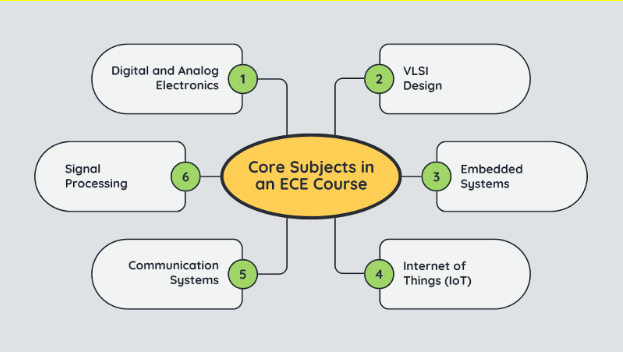ECE in the Age of AI & Machine Learning: Why It’s More Relevant Than Ever

Blog / April 03, 2025
ECEElectrical and Computer EngineeringInnovation is the heartbeat of the modern world, orchestrating a symphony of seamless communication, intelligent automation, and groundbreaking advancements. From the invisible forces powering smart devices to the intricate networks enabling global connectivity, technology has woven itself into every facet of human life. The evolution of electronics has transcended mere convenience—it has become the foundation of industries, economies, and even human interaction itself.
In the pursuit of pushing these boundaries further, academic disciplines have evolved to nurture minds capable of designing, developing, and revolutionizing the way technology functions. With an intersection of hardware and software, this domain continues to shape the present while engineering the future. For those with a passion for circuits, signals, and systems, an education in this field unlocks limitless possibilities.

Exploring the World of ECE
An ECE course brings together electrical engineering concepts with contemporary communication features to provide students with a comprehensive grasp of circuit designs and digital systems, along with microprocessor applications and network communication rules. The curriculum combines hardware operations with software functions to enable students who want to innovate the next generation of communication devices and systems.
Core Subjects in an ECE Course
ECE programs base their curriculum on the delivery of fundamental practices together with theoretical concepts. Primary subjects within the ECE course include:
- Digital and Analog Electronics
- Microprocessors and Microcontrollers
- Signal Processing
- Communication Systems
- VLSI Design
- Embedded Systems
- Antenna and Wave Propagation
- Internet of Things (IoT)
- Artificial Intelligence and Machine Learning in Electronics
Graduates complete multiple subject areas, preparing them to face challenges across telecommunications, healthcare, aerospace and automation industries.
Duration for ECE Course
The ECE course duration varies depending on the level of education:
- Undergraduate Program (B.Tech in ECE): 4 Years (8 Semesters)
- Postgraduate Program (M.Tech in ECE): 2 Years (4 Semesters)
- Diploma in ECE: 3 Years
The organized academic design supports student educational development by teaching basic concepts before specializing their learning.
Fees for ECE Course
ECE course fees depend on three primary factors including the type of institution, its location and the additional services it provides. On average:
- Government Colleges: INR 50,000 to 1.5 lakh
- Private Universities: INR 2 lakhs to 5 lakhs per year
- Diploma Courses: INR 30,000 to 1 lakh per year
Numerous educational institutions grant scholarships and financial assistance to talented students, reducing their education expenses in ECE programs.
Career Prospects after an ECE Course
Graduates of an ECE course have a wide array of career opportunities in both core and non-core sectors. Some of the popular job roles include:
- Electronics Engineer
- Communication Engineer
- Embedded Systems Engineer
- VLSI Design Engineer
- AI & ML Specialist in Electronics
- Robotics Engineer
- Software Developer in Electronics
Revolutionize Technology: Study ECE @ Shiv Nadar University (Institution of Eminence)
The B.Tech. in Electrical and Computer Engineering at the School of Engineering allows students to develop expertise in AI, Machine Learning, VLSI and Embedded Systems, Modern Energy Systems, Internet of Things (IoT), Communication Systems, and Computer and Network Architecture. Through a well-structured curriculum and state-of-the-art laboratories, the School aims to prepare students to tackle real-world challenges in the fields of Electrical, Electronics, Communication, and Computer Engineering.
Specializations offered @ Shiv Nadar University:
- Modern Energy Systems
- Embedded Systems and Computer Engineering
- Analog/R.F. and Communication Systems
- Sensors and Nanoelectronics
The School provides high-quality technical education to students in emerging Electrical, Electronics, and Computer Engineering fields, allowing them to be competitive worldwide and also get prepared for design and innovation-centric careers that contribute to advancing the state of engineered systems.
Parting Notes
An ECE course is an entry path to a fast-paced, technology-focused profession that enables creative people to advance technological possibilities through innovative solutions. Engineers who select ECE as their field receive wide-ranging career possibilities while benefiting from its extensive academic content because this career path continues to draw passionate students.
An ECE course teaches fundamental skills that lead to a prosperous future in technology through designing innovative communication systems and developing AI-driven electronic equipment. Students who wish to establish themselves in this field must choose the proper institution while determining the ECE course span and associated costs. The complete educational experience at Shiv Nadar University produces successful engineers who advance global technology development. Apply Now!
FAQs
What is the scope of an ECE course in today’s technology-driven world?
An ECE course imparts a strong foundation in electronics and communication, creating avenues for career opportunities in AI, IT, automation, telecommunications, and space research industries.
What are the eligibility criteria for enrolling in an ECE course?
The eligibility criteria for admission specifies a 10+2 degree with Physics, Chemistry, and Mathematics as compulsory subjects. Some universities might also require entrance exam scores like JEE or conduct their own entrance exams.
What are the job prospects after completing an ECE degree?
Graduates can work as Electronics Engineers, Embedded Systems Engineers, Communication Engineers, VLSI Design Engineers, and AI/ML Specialists in industries such as IT, healthcare, and space research.
How does an ECE course integrate software and hardware knowledge?
ECE programs blend hardware concepts like circuit design and embedded systems with software applications such as AI, IoT, and machine learning, preparing students for versatile careers in both domains.